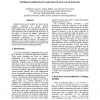Free Online Productivity Tools
i2Speak
i2Symbol
i2OCR
iTex2Img
iWeb2Print
iWeb2Shot
i2Type
iPdf2Split
iPdf2Merge
i2Bopomofo
i2Arabic
i2Style
i2Image
i2PDF
iLatex2Rtf
Sci2ools
110
click to vote
ICTAI
2006
IEEE
2006
IEEE
Intelligent Neighborhood Exploration in Local Search Heuristics
Standard tabu search methods are based on the complete exploration of current solution neighborhood. However, for some problems with very large neighborhood or time-consuming evaluation, the total exploration of the neighborhood is impractical. In this paper, we present an adaptive exploration of neighborhood using extension and restriction mechanisms represented by a loop detection mechanism and a tabu list structure. This approach is applied to the K-coloring problem and evaluated on standard benchmarks like DIMACS in comparison with more powerful recently published algorithms.
Artificial Intelligence | Current Solution Neighborhood | ICTAI 2006 | Large Neighborhood | Standard Tabu Search |
Related Content
| Added | 11 Jun 2010 |
| Updated | 11 Jun 2010 |
| Type | Conference |
| Year | 2006 |
| Where | ICTAI |
| Authors | Isabelle Devarenne, Hakim Mabed, Alexandre Caminada |
Comments (0)

